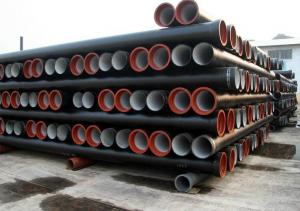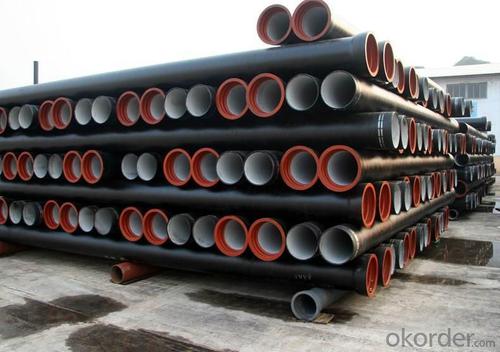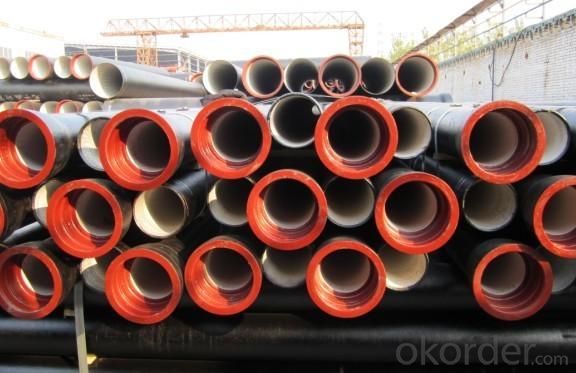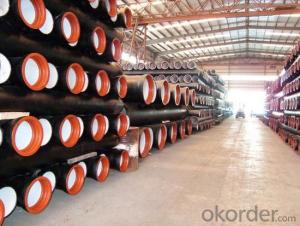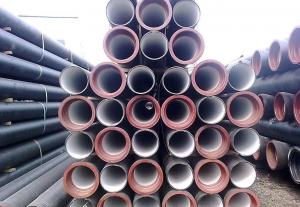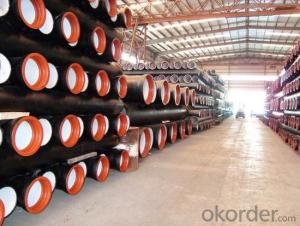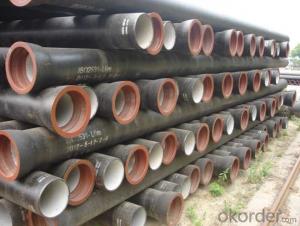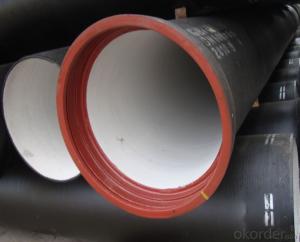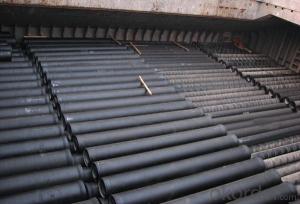Ductile Iron Pipe EN545/EN598 DN500-DN800
- Loading Port:
- China main port
- Payment Terms:
- TT or LC
- Min Order Qty:
- 1000 m.t.
- Supply Capability:
- 200000 m.t./month
OKorder Service Pledge
OKorder Financial Service
You Might Also Like
1.Ductile Iron Pipe Description :
1) Pipes confirm to ISO2531,K9 class,T type joint,6m long,with inside cements lining conform to ISO4179,outside Zinc
spraying(130g/m2) and bitumen coating(70μm) conform to ISO8179.
2) Pipe ends: Spigot and socket ends, with 100% SBR rubber gaskets accoding to ISO4633
3) we can do third party inspection according to customer's request.
2.Main Features of the Ductile Iron Pipe:
1).Quality guarantee
• Chemical checking
• NDE after rough machining
• Mechanical testing after heat treatment
• Final NDE,dimension inspected
2).Packing and Shipping
• standard export package(carton/wooden case/pallet)
• accept FOB,FAS,CNF,CIF door to door etc or customer designated shipping agent
3.Ductile Iron Pipe Images:
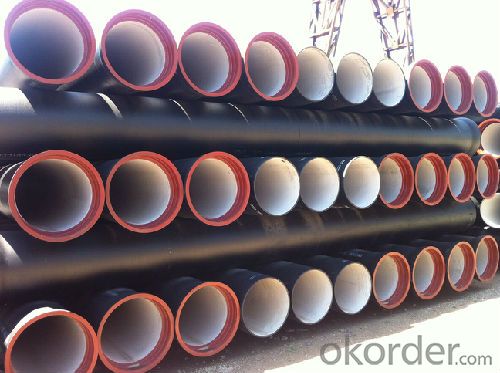
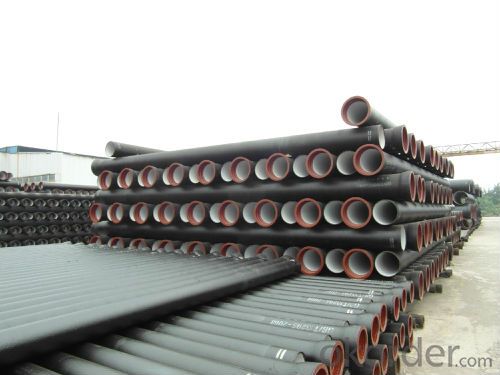
4.Ductile Iron Pipe Specification:
Internal lining: ductile iron pipes shall have an internal cement mortar lining in acc with ISO4179.
External coating: ductile iron pipes shall be externally coated with metallic zinc spray plus a further layer of resin
painting to ISO8179.
Gasket: 100% SBR/NBR/EPDM rubber gasket in accordance with ISO4633.
Packing: ductile iron pipes from DN100 to DN300 be bundled with steel belts, others are in bulk.
Payment term: L/C, T/T.
5.FAQ:
We have organized several common questions for our clients,may help you sincerely:
1.Q: Why would you choose ductile iron pipe rather than other pipe materials?
A:The reasons are obvious for that not only ductile iron pipe possesses the inherent strength and flexibility of ductile
iron, combined with proven corrosion protection systems, but also the cost savings can be achieved from design to
installation and commissioning.
2.Q:Why can you guarantee the inner of pipes can’t be corroded?
A: High alumina cement mortar lining and sulphate-resistant cement mortar lining. These two special linings are applicable
to inner anti-corrosion for sewage pipes, improving resistance to erosion of the sewage components.
- Q: Can ductile iron pipes be used in nuclear power plants?
- Yes, ductile iron pipes can be used in certain applications within nuclear power plants. However, their use is limited to non-safety-related systems where they are not exposed to radioactive environments or high-pressure conditions. Safety-related systems within nuclear power plants typically require materials with higher resistance to radiation and pressure, such as stainless steel or other specialized alloys.
- Q: How does ductile iron pipe perform in high-pressure gas applications?
- Ductile iron pipe performs well in high-pressure gas applications due to its inherent strength and durability. Its ability to withstand high internal and external pressures makes it a reliable choice for transporting gases safely and efficiently. Additionally, ductile iron's resistance to corrosion and its tight joints further enhance its performance in high-pressure gas environments.
- Q: How are ductile iron pipes restrained against axial thrust forces?
- Axial thrust forces are effectively restrained in ductile iron pipes by utilizing both mechanical restraints and soil resistance. A commonly employed method involves the use of thrust blocks, which are concrete structures constructed at bends, tees, and other directional changes in the pipeline. These blocks are specifically designed to withstand axial forces and prevent any shifting or movement of the pipes caused by the pressure exerted by the flowing fluid. Furthermore, additional support and prevention of axial movement are achieved through the implementation of mechanical restraints, such as pipe restraints, thrust collars, and anchor blocks. Pipe restraints are devices installed around the pipe and connected to adjacent structures, such as walls or concrete collars, in order to prevent any sort of movement. Thrust collars, on the other hand, are utilized to absorb and distribute the thrust forces generated by the flowing fluid. These collars, typically made of ductile iron or steel, are securely fastened around the pipe to counteract axial movement. Moreover, soil resistance plays a crucial role in restraining axial thrust forces. The weight of the soil surrounding the pipe creates frictional resistance, which effectively counteracts the axial forces. In order to ensure effective soil resistance, it is vital to properly backfill the trench, compact the soil, and adequately embed the pipe in the soil. In conclusion, a comprehensive approach involving the use of mechanical restraints such as thrust blocks, pipe restraints, and thrust collars, along with the soil resistance provided by proper trench backfilling and compaction, is employed to restrain axial thrust forces in ductile iron pipes. This approach guarantees the secure placement of the pipes and their ability to withstand the axial forces exerted by the flowing fluid.
- Q: How are ductile iron pipes protected against external corrosion?
- Ductile iron pipes are protected against external corrosion through the application of protective coatings such as polyethylene, epoxy, or zinc. These coatings act as a barrier between the pipe and the surrounding environment, preventing contact with corrosive elements such as water, soil, or chemicals. Additionally, cathodic protection techniques, such as sacrificial anodes or impressed current systems, may also be employed to further enhance the corrosion resistance of ductile iron pipes.
- Q: How can 4 inch ductile iron pipe be connected with 2 inch galvanized pipe?
- Ductile cast iron used for more than 18 by adding nodulizer, after centrifugal ductile cast iron machine high speed centrifugal cast pipe, called "ductile" (Ductile Cast Iron Pipes), referred to as ball pipe, ductile iron pipe and ductile iron pipe etc.. The utility model is mainly used for conveying water, and is an ideal choice for tap water pipes.
- Q: Can ductile iron pipes be used for stormwater drainage?
- Yes, ductile iron pipes can be used for stormwater drainage. Ductile iron pipes are known for their strength and durability, making them suitable for various applications, including stormwater drainage systems. These pipes have high tensile strength and can withstand heavy loads and pressure, making them ideal for carrying large volumes of stormwater. Additionally, ductile iron pipes have a smooth interior surface that reduces friction and allows for efficient flow of water, minimizing the risk of blockages and clogging. With proper installation and maintenance, ductile iron pipes can provide a reliable and long-lasting solution for stormwater drainage.
- Q: Can ductile iron pipes be used for wastewater pumping stations?
- Yes, ductile iron pipes can be used for wastewater pumping stations. Ductile iron pipes are durable, corrosion-resistant, and have high tensile strength, making them suitable for transporting wastewater and withstanding the pressure and chemicals involved in pumping stations. Additionally, their flexibility allows for easy installation and maintenance in various environmental conditions.
- Q: Are ductile iron pipes available for cutting and are there any relevant specifications?
- You can cut, there should be no specification requirements, as long as you can use, in line with the needs of the project can
- Q: Can ductile iron pipe be used for pump stations?
- Certainly, pump stations can utilize ductile iron pipe. Ductile iron pipe is extensively employed in underground water and wastewater systems, including pump stations. It provides numerous benefits, including remarkable strength, durability, and resistance to corrosion, thus ensuring its appropriateness for such purposes. Moreover, ductile iron pipe seamlessly harmonizes with various pump types and is renowned for its extended lifespan, rendering it an optimal selection for pump station projects.
- Q: Can ductile iron pipe be used in high-pressure applications?
- Yes, ductile iron pipe can be used in high-pressure applications. Ductile iron pipe is known for its strength and durability, making it suitable for a variety of applications, including high-pressure systems. It has a higher tensile strength and yield strength compared to other types of cast iron pipes, allowing it to withstand higher pressures. Additionally, ductile iron pipe is resistant to corrosion and can maintain its structural integrity even under high-pressure conditions. However, it is important to ensure that the pipe is properly installed, and all necessary safety measures are followed to ensure the safe and efficient operation of the high-pressure system.
Send your message to us
Ductile Iron Pipe EN545/EN598 DN500-DN800
- Loading Port:
- China main port
- Payment Terms:
- TT or LC
- Min Order Qty:
- 1000 m.t.
- Supply Capability:
- 200000 m.t./month
OKorder Service Pledge
OKorder Financial Service
Similar products
Hot products
Hot Searches
Related keywords
